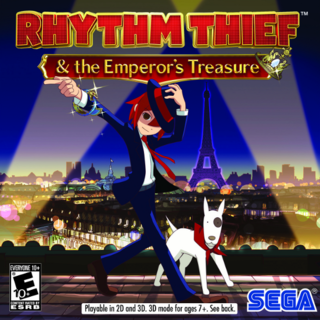SEGA's rhythm take on the Professor Layton formula, resulting in a stylish and very interesting game.
Story: 9/10
You play as Raphael during the day and Phantom R at night. An interesting thief that steals artwork but returns it the following day. Through his series of thefts, he uncovers a secret within Paris that could threaten the world and it's up to Phantom R to thwart the evil and unravel the mysteries behind it.
Obviously I want to avoid spoilers so the story sounds cliche but like with most game stories, it's more about the journey rather than the premise and this game has its fair share of twists and surprises. It takes a bit for the story to become interesting but when you do, you get hooked.
Visuals: 9/10
I know I've said it but Rhythm Thief is a very stylish game filled with personality unique to SEGA. Like Professor Layton, there are amazing looking animated cutscenes and the cell shaded in game visuals are also very charming. The game has a lot of flash and is just a joy to watch.
Sound: 10/10
It's a rhythm game and a genre that SEGA is no foreigner to, the game's soundtrack is very catchy and upbeat while suitable to the game's overall tone and mood. Several tracks will stick with you or pretty much force you to replay just to listen to the song again. The voice acting is also very well done, adding to the personality of each character.
Gameplay: 9/10
Rhythm Thief borrows some gameplay elements from Professor Layton, with a map on the top screen and a picture of the area on the bottom screen, unlike Professor Layton, navigation through the map is done using the D-pad. You can search around each area for hidden items, mainly coins used to purchase items (games you missed, items for rhythm games or the cutscenes), music tracks, and phantom notes (which you will find are a pain to get but are required to unlock one of the side stories). However the way this is executed is done with less finesse than Professor Layton, whereas Layton hint coins are typically in actual places, Rhythm Thief's items are scattered around the area from the railings, clouds, lights, pretty much forcing you to tap randomly around the area in order to obtain all of the items in the area.
The rhythm games are varied and you'll rarely revisit the same type of game until later in the game (in which I recommend you practice because when the game revisits a specific game, the difficulty is amped up). Rhythm Thief makes great use of 3DS's capabilities, mainly the touch screen but you'll be using the gyroscope every now and then and the face buttons and D-pad. The game starts off easy and remains easy for the first half of the game, although due to the varied nature of the game, some games will naturally be more difficult than others, like I said earlier, I do recommend practicing certain minigames that you struggle with because in the 2nd half of the game, the difficulty spikes and you'll find yourself being smashed with very fast beats and complex combinations. Each game is divided into 3 "stages" of course each getting more difficult with each stage.
While the overall game is very fun, the most infuriating thing about the game is the scoring/grading system, which drops your grade by 1.5 letters (typically) whenever you miss a note. This is fine if you botch the first stage and do well to the next two stages but since the stages naturally get harder, you're more likely to ace the first two stages and botch the third. Even if you score a perfect on every single note but miss the last, you'll be given a C instead of an A, which can be extremely frustrating for anyone who likes getting a high score.
One thing I especially loved was how Rhythm Thief presented you with rhythm games based on their previous music games (if you know SEGA well, you should know what to expect but if you don't, well I won't ruin the surprise).
Value: 8/10
It's a good value, although it took me only 7 hours to beat the story, there are side stories that you can unlock through finding all of the Phantom Notes (the random nature of their appearance makes it difficult to find every single one), completing the Ultimate Instrument (I encountered a glitch that prevented me from getting a sound necessary in completing the instrument so I hope it doesn't happen to any of you) and getting an A on every rhythm game (I wish thee luck). Also one major advantage this game has over Professor Layton is the replayability, puzzles typically are no longer fun to redo once you solve it, but Rhythm Thief's rhythm games are fun to replay and since you are encouraged to get A's in every game to unlock everything it'll only add more value to the game.
Overall: 9/10
Rhythm Thief and the Emperor's Treasure is an excellent new IP from SEGA, it gives us hope that the talent that we remember from SEGA back during the Dreamcast days is still present. The game is full of style, personality and great music. The game did end on a cliffhanger so I really do hope SEGA makes a sequel because it can evolve into a really great IP for the 3DS.

